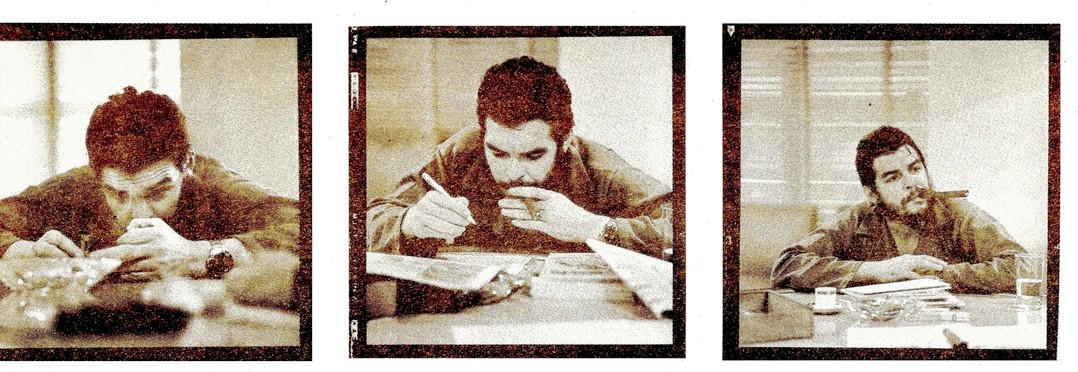The coup against Jacobo Arbenz in Guatemala in 1954 (see Collection L) was a watershed moment in 20th century Latin America. It suggested to those who felt that justice and equality could be achieved from within the existing system, that Latin American oligarchies and their allies in the U.S. would not let that happen. One person who witnessed the coup first-hand was the person at the centre of Collection M: the allergologist Ernesto Guevara de la Serna. He lived in Guatemala at the time, together with his Peruvian partner Hilda Gadea, an active supporter of the Arbenz government. The savage repression that followed the coup and Hilda’s arrest and eventual release forced them to leave the country for Mexico. There, Guevara met the group of exiled Cuban revolutionaries around Fidel Castro with whom he would eventually embark to Cuba, first to engage in guerrilla warfare there. Eventually he followed his profound anti-colonial convictions and participated in liberation struggles in Angola, Congo and Bolivia, where he was killed in 1967.
In 2017, the Mexican writer Paco Ignacio Taibo II, published a bestselling biography on Guevara, entitled Ernesto Guevara, también conocido como el Che. Taibo’s family had fled the nationalist-fascist regime of General Franco in Spain to Mexico, where they arrived in 1958. Paco Ignacio II became a well-known bestselling author of fiction and non-fiction books, all of which explore questions of justice versus corruption and repression. When researching for El Che,Taibo II accumulated a vast collection of documents on Guevara, ranging from books and photographs over correspondence to articles and manuscripts. He donated this archive to the CAMeNA to make it accessible to the public, and it has now become Collection M.
Ernesto Guevara was possibly the most globally significant and influential 20th century Latin American thinkers and practitioners. Taibo has characterized him as ‘romantic, adventurous, and a vagabond’, and has pointed out that Guevara’s politics were based on ethics, and not on negotiations. Throughout his life and even after his death Guevara galvanized people into action and into thinking outside the box (whereby ‘thinking’ is understood as analytically grounded political imagining). He did not accept limitations, whether personal limitations imposed on him by severe asthma, or those imposed on history and politics by those who want to keep the status quo. He was fiercely disciplined in his lifestyle, and an innovative decolonial and anti-imperialist political thinker (see for example his notes on the Manual of Political Economy of the Academy of Sciences of the USSR N AL 2). Like few other individuals he personified pan-Americanist solidarity. In her recollections of the young Guevara available in collection M, his school friend Dolores Moyano writes about the Guevara family that ‘in their house the inevitable never happened, only the unexpected.’ Collection M captures that spirit.
Collection M is vast and shows the painstaking and wide-ranging research that Taibo carried out for the biography. Here I will briefly signpost some aspects that reflect Taibo’ enquiry into the interplay between the person Ernesto Guevara and the figure of el Che. The collection is a wonderful resource for those researching the life and thought of Guevara. It also shows the emergence of the biography authored by Taibo, and it holds materials of interest to all those who investigate representations of ‘el Che’. Under the rubric ‘Pensamiento y filosofía’ we find two large collections entitled ‘El Che Guevara. Vida, pensamiento y acciones. América Latina, 1961-2007’, I and II (N AL 1 volumes 1 and 2). They contain articles, interviews, press clippings and other documents about Guevara’s biography and thought. These collections are as informative as they are entertaining. They are complemented by ‘El Che Guevara. Mito revolucionario y mercancía. América Latina, 1968-2002’, catalogued under the rubric of ‘Periodismo y comunicación’ as O AL 1. The documents focus on the creation of the icon ‘El Che Guevara’ and capture another element of 20th century Latin American and international intellectual and political history, namely the commodification of the figure of one of the continent’s outstanding political practitioners and thinkers. Under the rubric ‘Expresiones y manifestaciones culturales’ we find under E AL1 and E AL 2 collections of photographs by and of Ernesto Guevara. Of relevance to the complicated question of how to remember and honour a person and a legacy as complex as his, is a collection that is filed under the rubric of ‘Grupos y conflictos armados’, as G AL 4, of ‘Homenajes, monumentos y memoriales en honor del Che Guevara. América Latina, 1969-2004’, which collects everything from songs about Guevara, to articles about monuments and about institutions named after him, such as schools.
Under the rubric ‘Grupos y conflictos armados’ we find testimonies of people who knew Guevara while he was involved in armed struggle. The material collected in this section is of interest not only with regards to Guevara himself; it also allows glimpses on those who worked outside of the limelight, sometimes in his shadow, and whose voices are preserved through their stories of him. A particularly moving document is the typed manuscript of a biography of Juan Pablo Chang Navarro Levano (G AL 1), a Peruvian citizen of Chinese descent, who fought with Guevara in Bolivia and was executed with him.
According to Taibo, one can only approach ‘el Che’ through heterodoxy – and this is reflected in the collection of materials he generously donated. The material on Guevara’s life, his work, and the responses resist the boundaries imposed by any form of categorization, reminding us that we should not resign ourselves to the inevitable and should instead embrace the unexpected.
The research on which this post is based was funded by The Leverhulme Trust Fellowship on ‘Acquiescent Imaginaries: Snapshots from the Cultures of Low-Intensity Democracies ’. Cornelia Gräbner would like to thank the staff at the CAMeNA for their generous collaboration and support.
Re-posted from: https://wordpress.com/post/poeticsofresistance.wordpress.com/

